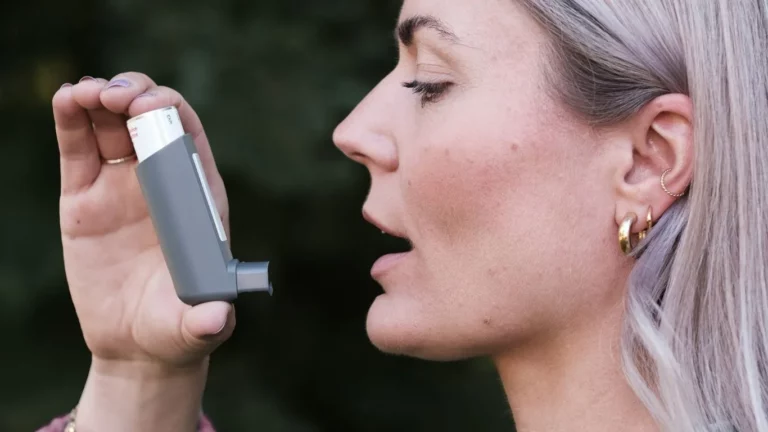Can Asthma Cause Pain When Exhaling? Discover the Alarming Truth
Can asthma cause pain when exhaling? It’s a question I’ve heard more than a few times in clinic—usually from patients who are surprised that their asthma feels like more than just wheezing or shortness of breath. As a pulmonary nurse practitioner, I’ve had countless conversations around symptoms that don’t quite fit the classic mold. Truth is, yes, asthma can sometimes cause discomfort or even pain when breathing out, and there are some solid reasons why that happens. Let’s dig into it, not with textbook jargon, but with real talk and a bit of my personal experience tossed in.
What Asthma Really Feels Like (It’s Not Always Wheezing)

Most people think asthma is all about wheezing or needing an inhaler during exercise. But asthma symptoms aren’t always so straightforward. In fact, pain when exhaling is something a surprising number of people experience—and they don’t always connect it to asthma.
Personally, I’ve seen patients describe this pain as a “tight pulling” across the chest, a “burning sensation,” or even sharp jabs near the ribs when breathing out. It’s not constant, but when it hits, it can feel downright alarming. Some folks even think they’re having a heart issue.
So, Can Asthma Cause Pain When Exhaling? Let’s Break It Down
The short answer is yes. But the why is what really matters here. Let me explain with a few clinical and real-world reasons:
- Bronchial Inflammation: Asthma causes the airways to swell and become inflamed. This inflammation can make the simple act of exhaling feel like pushing air through a tiny, angry straw—especially during a flare-up.
- Chest Muscle Fatigue: During an asthma attack or even a mild episode, you’re working harder to breathe. This overuse can strain the intercostal muscles (the ones between your ribs), leading to soreness and pain, especially when exhaling forcefully.
- Trapped Air: Asthma can cause air trapping, where it becomes hard to fully breathe out. That built-up air pressure can lead to discomfort and pressure-like pain in the chest.
Now, while this kind of pain isn’t always dangerous, it’s definitely not something to brush off. I always tell my patients—pain is your body’s way of flagging a problem. It deserves your attention.
How to Tell if It’s Asthma or Something Else

This is where things can get a little tricky. Because the chest is kind of a crowded place, pain while exhaling could also mean something else entirely. I’ve had patients come in thinking it was asthma when it was really acid reflux, a muscle strain, or in rare cases, even a pulmonary embolism. (Scary, right?)
So how do you know if asthma is to blame? Here are a few clues:
- The pain worsens with cold air or allergens — common asthma triggers
- You’re using your rescue inhaler more often and it helps ease the pain
- You feel tightness in your chest with shortness of breath or wheezing alongside the pain
- The pain is intermittent and often flares up during or after physical activity or at night
That said, chest pain is never something to self-diagnose. Always rule out cardiac or other serious causes first—especially if it’s new, intense, or comes with dizziness, nausea, or sweating.
When Patients Tell Me About Painful Breathing

I’ll never forget a patient—we’ll call her Tasha—who came in thinking she had pulled a chest muscle from yoga. Turned out, she was in the middle of an asthma exacerbation she didn’t recognize because she wasn’t wheezing. She just had this dull, nagging pain every time she exhaled deeply. Her peak flow readings were way down, and after a round of steroids and adjusting her maintenance inhaler, the pain went away completely. That’s a big part of the job—connecting the dots that aren’t always obvious.
What Triggers Make Pain on Exhale Worse?

Here’s something I’ve noticed over the years: not all asthma pain is created equal. Some patients barely feel discomfort when they’re flaring up, while others are practically doubled over trying to breathe. A big part of that comes down to triggers. And let me tell you—when the right (or wrong!) combo of them hits, even mild asthma can start feeling painful, especially on the exhale.
Let me give you a real example. I had this patient named Marcus who always felt fine… until allergy season. Every spring like clockwork, he’d show up saying, “Bianca, I think I pulled a rib or something.” Nope. It was his asthma, flaring from pollen, tightening his airways so much that exhaling felt like a chore—and a painful one.
Common Triggers That Can Make Exhaling Hurt
- Cold air: Breathing in cold, dry air can irritate your airways and make it harder—and more painful—to breathe out.
- Exercise: Especially in people with exercise-induced asthma, the airways can narrow quickly, creating that tight, painful feeling in the chest when exhaling.
- Allergens: Dust, pollen, pet dander, and mold can flare things up fast.
- Respiratory infections: Even a basic cold or sinus infection can make asthma worse and lead to painful breathing.
Pro tip from the clinic: Track your symptoms in a journal. Not just the pain, but what you were doing, where you were, and what the weather or air quality was like. Over time, you might see a pattern—and that gives us a starting point to build a smarter treatment plan.
Tools and Techniques That Actually Help

When someone tells me they feel pain when breathing out, we don’t just throw meds at it and hope for the best. Managing asthma—especially the kind that brings pain into the mix—takes a blend of strategy, self-awareness, and yes, sometimes a little trial and error.
Here’s what I often suggest to patients in my practice:
- Use a spacer with your inhaler. It might sound basic, but using a spacer can make a big difference. It helps the medicine get deeper into your lungs where it actually needs to go, not just stuck on the back of your throat.
- Incorporate breathing exercises. Diaphragmatic breathing (aka belly breathing) can really help relax those tight chest muscles and reduce that exhale pain.
- Warm up before exercise. If exercise triggers your symptoms, a proper warm-up and pre-treatment with your inhaler can help prevent those painful episodes.
- Stay ahead of triggers. On high pollen or cold days, limit outdoor exposure, use a mask if needed, and run a HEPA filter indoors.
I’ll be honest—some of this seems simple, but when patients actually stick with it, I’ve seen big changes. One guy told me, “I didn’t realize half my breathing pain was from not using the spacer right!” It’s the little things sometimes.
Why Monitoring Your Symptoms Matters (More Than You Think)

This is where a little bit of accountability goes a long way. If you’re dealing with pain while exhaling and suspect asthma’s to blame, don’t just wait for the bad days. Track your breathing regularly. I encourage my patients to keep tabs on:
- Peak flow readings (you can grab a meter from most pharmacies)
- Daily symptoms, even mild ones
- Triggers and environmental changes
- Any pain with breathing—inhalation or exhalation
And yes, bring that info to your appointments! I can’t stress this enough: data equals power. It helps us make smart changes to your treatment plan. Maybe you need a different inhaler. Maybe you need allergy testing. Maybe that pain is signaling early warning signs of poor asthma control. Don’t ignore it.
One of my long-time patients said it best: “Once I treated my asthma like something I could actually manage instead of fear, everything got easier—including that awful breathing pain.”
When to Worry: Pain When Exhaling Isn’t Always “Just Asthma”

Let’s be real for a second—yes, asthma can cause pain when exhaling, but not every ache or tightness should be chalked up to your lungs acting up. I’ve had folks come into my clinic saying, “It’s just my asthma,” but after a few questions and a listen to their lungs, the story changed. And that’s where experience matters.
Sometimes, chest pain during exhale can be a red flag for something else. A few conditions I always rule out:
- Pleurisy: Inflammation of the lining around your lungs. This can cause sharp pain, especially when breathing deeply or coughing.
- Pulmonary embolism: Rare, but serious. Usually comes with sudden chest pain and shortness of breath. This is a medical emergency.
- Muscle strain: Maybe from excessive coughing or even bad posture—yes, that counts!
- Gastroesophageal reflux (GERD): That acid creeping up can mimic chest pain, especially when lying down.
Bottom line? If the pain is new, severe, or you have other symptoms like dizziness or nausea, get it checked out—stat. Better safe than sorry. I always say it’s better to be the “worried well” than the “undiagnosed sick.”
Getting the Right Treatment Plan (Because You Deserve Better)

If you’ve made it this far, you probably either deal with asthma personally or know someone who does. Either way, knowing how to take control of it makes a huge difference—not just in comfort, but in quality of life. And that includes the frustrating symptom of pain when exhaling.
From my seat in the exam room, I always try to go beyond the quick fix. Of course we can prescribe inhalers—and yes, they’re life-saving—but effective asthma care is about customizing treatment. Every patient is a little different, and what works for one doesn’t always cut it for another.
What Should Be in a Solid Asthma Action Plan?
Here’s what I generally include when helping someone who’s dealing with pain when exhaling as part of their asthma symptoms:
- Daily maintenance medication: Usually an inhaled corticosteroid to reduce baseline inflammation.
- Rescue inhaler: Like albuterol—for those “bad days” or sudden flare-ups.
- Trigger management: From HEPA filters to allergen-proof bedding, little changes make a big impact.
- Regular check-ins: You wouldn’t believe how many asthma patients go years without follow-up—don’t be one of them.
And yes, if pain is a persistent part of your asthma experience, that’s part of the plan too. Sometimes it means adjusting your meds. Other times it’s about identifying an overlap—like asthma and anxiety, or asthma and reflux. Either way, you deserve a provider who listens. I’ve seen patients cry from relief just because someone finally took their symptoms seriously.
Final Thoughts from the Clinic
To wrap this all up—if you’ve been wondering “can asthma cause pain when exhaling?”—you’re not imagining it. The answer is absolutely yes. But that pain is your body’s way of nudging you to pay attention, not suffer silently. I’ve cared for people of all ages, from teenagers gasping through sports to retirees who thought their shortness of breath was just aging. The common thread? Awareness and good management changes lives.
It’s easy to underestimate asthma when it’s not dramatic. But when something feels off—like pain that shows up only when you breathe out—it’s worth digging into. Advocate for yourself. Take note of patterns. Talk to a provider who sees the full picture. That’s how you stay ahead of it.
Trusted References for Deeper Reading:
- Centers for Disease Control and Prevention (CDC)
- American Lung Association
- Global Initiative for Asthma (GINA)
- National Heart, Lung, and Blood Institute
Disclaimer
This article is for informational purposes only and is not a substitute for professional medical advice, diagnosis, or treatment. Always consult with your healthcare provider about any concerns you may have regarding your asthma symptoms or treatment plan.

Bianca Nala is a compassionate Nurse Practitioner with a strong background in primary and respiratory care. As a health writer for Healthusias.com, she combines her clinical expertise with a talent for clear, relatable storytelling to help readers better understand their health. Bianca focuses on topics like asthma, COPD, chronic cough, and overall lung health, aiming to simplify complex medical topics without losing accuracy. Whether she’s treating patients or writing articles, Bianca is driven by a single goal: making quality healthcare knowledge accessible to everyone.







